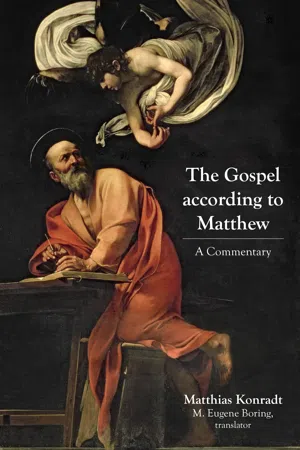
- 480 pages
- English
- PDF
- Available on iOS & Android
About this book
Perhaps the most important discovery in the long history of research on the Gospel of Matthew is that the book represents a self-contained literary whole as it participates in a vibrant intertextual network. Scripture illuminates the gospel story at every step, from the appearance of Jesus to the resistance of the authorities who oppose him. The famed intertextuality of Matthew, when considered alongside the social contexts in which the Matthean community lived, helps us recognize the strategy of this Gospel: the constant references to the scriptural text should assure those addressed that Christ-faithful communities are the true guardians of the theological traditions of Israel.
The Gospel according to Matthew provides a comprehensive interpretation of the Gospel of Matthew that draws on the best of modern research. Along with an analysis of the narrative structure, Matthias Konradt discusses the dense network of references to the Scriptures of Israel as well as the historical situation in which the Gospel was composed, namely the conflict between believers in Christ and the predominantly Pharisaic synagogue. Konradt focuses on theological topics such as the narrative unfolding of Jesus' messianic identity as Immanuel, Son of God, and Son of David; Matthew's understanding of discipleship and the church; the role of Israel and the Gentiles; and ethical orientation with its relationship to the Torah.
From the richness of Matthew's theological reflection emerges the challenging question of the Gospel's meaning and relevance for today. Modern scholarship has correctly emphasized that Matthew is an inclusive history--it tells the story of the past in a way that reflects and speaks to the experiences of the community. Taking into account a broad sweep of scholarly approaches to this text, Konradt provides a clear outline of the Gospel by tracing the shape of Matthew's masterful narrative dynamics and the evangelist's careful unfolding of theological doctrine.
Frequently asked questions
- Essential is ideal for learners and professionals who enjoy exploring a wide range of subjects. Access the Essential Library with 800,000+ trusted titles and best-sellers across business, personal growth, and the humanities. Includes unlimited reading time and Standard Read Aloud voice.
- Complete: Perfect for advanced learners and researchers needing full, unrestricted access. Unlock 1.4M+ books across hundreds of subjects, including academic and specialized titles. The Complete Plan also includes advanced features like Premium Read Aloud and Research Assistant.
Please note we cannot support devices running on iOS 13 and Android 7 or earlier. Learn more about using the app.
Information
Table of contents
- Cover
- Half-title Page, Title Page, Copyright
- Contents
- Author’s Preface to the English Edition
- Translator’s Preface
- Author’s Preface to the German Edition
- Introduction
- 1. The Prologue (1:2– 4:16)
- 2. Jesus’ Ministry in Israel and the Mission of His Disciplesto Israel (4:17– 11:1)
- 3. Between Hostility and Confession as Messiah: Reactions to Jesus’ Ministry in Israel and Their Results (11:2– 16:20)
- 4. The Passion as the Central Point of the Way of the Messiah— Suffering and Service as Signs of Discipleship to Christ (16:21– 20:34)
- 5. Jesus’ Final Controversy with His Opponents and the
- 6. The Passion and Resurrection of Jesus and the Commissioning of the Disciples to the Universal Mission (26:1– 28:20)
- Bibliography
- Subject Index